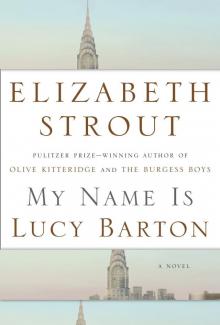- Home
- Elizabeth Strout
Abide With Me Page 2
Abide With Me Read online
Page 2
“Do you think I should buy a new one?”
“Yes, I do.” With her wrist, she pushed at a lock of hair that had slipped from behind her ear, then reached into her sweater pocket and found a bobby pin. “Goodness. Buy two.”
The minister, relieved by this assignment of something specific to do, decided he would drive to Hollywell and do his shopping there rather than risk being seen by one of his congregants closer to West Annett, who might—after Sunday—wonder whether he himself had not fallen prey to the Perils of Personal Vanity. He found his wallet, his car keys, his hat, and, humming softly the hymn that had come into his head, “I would be true for there are those who trust me,” the man walked down the tilting porch steps.
A SQUIRREL PATTERED across the porch, and a breeze knocked a branch against a window shutter. Inside, things were silent except for the opening and shutting of a closet door as Connie Hatch put away the bath towels, then took a mop to the living-room floor. Think, for a moment, about Connie. The woman was forty-six years old. She had expected to have children, and it had not happened. This, as well as certain incidents that had occurred (secrets that troubled her sleep, often with the horrible presence of two gazing eyes)—all this kept her beneath a private and growing carapace of confusion, and if someone had stepped into the minister’s living room and said, “Connie, how has your life been?” she might not have known what to say. Well, nobody was going to ask her, anyway.
But she had trouble keeping a thought in her head. Her mind was like the skitter-skatter of a bad channel on the television set her husband had brought home last winter. She had forgotten to ask the minister if he would be back in time for lunch, though he probably would not be if he had gone all the way to Hollywell, but the uncertainty of this, of what was expected of her, occupied her mind. (Even though the minister was the easiest person she’d ever worked for; the same had not been true about his wife.) Years ago, Connie had done poorly in school, and no birthmark marked her as that had, the red horror of a D on the top of her test papers, red notes scrawled in the margins, one teacher who had written in block letters CONNIE MARDEN, USE YOUR HEAD. Connie whacked the mop against the squat wooden leg of the couch. If the minister came back in time for lunch, she would make him tomato soup from the can and set out a plate of buttered saltines; he always enjoyed that. She stopped to pin her hair up once again.
Did Connie know—she probably did—that she was one of those women you pass in the grocery store and see without seeing? But there was a softness in her face, a touching hesitancy, as though she had spent many years trying to be cheerful and no longer was, but the remnants of an earlier, eager kindness still remained. Her features had not hardened, in other words, and there were many women in that region whose features had hardened, women who had faces that could, by middle age, be the face of a man, but this was not the case for Connie Hatch.
People still said sometimes, “Doesn’t that Connie Hatch have pretty eyes,” although chances are the conversation stopped at that, because what else was there to say at this point about Connie? She had been married to Adrian Hatch for years, working for a while in the kitchen at the Academy, and then at the county farm—what they called the county nursing home—but she’d quit two years ago to help take care of her mother-in-law, a fairly saintly thing to do, people agreed, since Evelyn Hatch got neither better nor worse, but stayed right on in the large old Hatch home, while Connie and Adrian remained in the trailer next door.
Later, people would try to recall what they could about Connie. Only a few would mention how attached she had been to her brother, Jerry, how she was never the same after he was killed in the Korean War. Connie didn’t go to church anymore. Some women in the Ladies’ Aid were bothered by this; Connie didn’t care. What she cared about, as she stepped out the minister’s back door to shake the mop, was how last night Adrian had not defended her when Evelyn said, “You can’t even control your goddamn dog, Connie. Just imagine if you’d had kids.” Adrian stood in the doorway of the trailer and didn’t say a thing.
Connie shook the mop with a spasm of ferociousness, so the mop head fell off and she had to walk down the back steps to retrieve it from the leaves and gravel, all the while the bright sun slapping up against the barn.
THE MINISTER DROVE the back road to Hollywell, looking for God and hoping to avoid his parishioners. He drove with the window down, his elbow resting on the window edge, ducking his head to peer at the hills in the distance, or at a cloud, white as a huge dollop of frosting, and at the side of a barn, fresh with red paint, lit by this autumn sun; and he thought: I would have noticed this once. Even as he noticed it now. This feeling of incongruity was something he had come to fear, and he drove slowly because of it, and because he had sometimes been visited with the awful thought that he might run over a child—although there was not a person in sight—or that he might, without meaning to, drive straight into a tree.
Keep moving, he thought.
And keep an eye out for God. Who was, if you cared for the Psalms, as Tyler did, looking right now from heaven, beholding all the sons of men, considering all their works. But what Tyler longed for was to have The Feeling arrive; when every flicker of light that touched the dipping branches of a weeping willow, every breath of breeze that bent the grass toward the row of apple trees, every shower of yellow ginkgo leaves dropping to the ground with such direct and tender sweetness, would fill the minister with profound and irreducible knowledge that God was right there.
But Tyler was wary of shortcuts, and he was really afraid of cheap grace. He often thought of Pasteur’s remarks that chance only helped those minds well prepared, and he hoped these days to have a moment of exalted understanding come to him as the “chance” result of his disciplined prayer. There was a fear the man lived with, a dark cave inside him: that he might not feel The Feeling again. That the exhilarating moments of transcendence had merely been the product of a youthful—and perhaps not even manly—form of hysteria, the kind that, taken to an extreme, could arguably produce the Catholic Saint Thérèse of Lisieux, who had died while still a young girl, and whose innocence surpassed him by the length and width of heaven. No, Tyler was earthly bound at the moment, and he accepted this. Sun bounced off the red hood of the old Rambler as the tires rumbled over the road. He passed a field of cows, pumpkins at a farm stand. On the way home he should buy a pumpkin for Katherine.
Hollywell’s Main Street opened before him, with the ivy-covered post office and, not far from the men’s clothing store, a parking space. In all things give thanks, and Tyler pulled the car in, checked for his wallet, stepped out into the sunshine.
But, oh.
Oh, boy.
Across the street, waiting for the traffic light to change—and there, it had changed now—Doris Austin, with the dark braid twisted tightly and neatly like a small basket on her head, was giving one more look to the right, to the left, cautious, holding a package in one hand, a brown pocketbook in the other, beginning to cross the street, and would, in just another moment, look up and see Reverend Caskey, and, oh, boy, he did not want to see her. He stepped into a pharmacy, walking over the threshold of its rubber mat while a little bell tinkled.
You never step in the same river twice, Heraclitus had said, and Tyler thought of this as he stood in the pharmacy, for he did feel frequently a sense of water rushing around him, and Doris Austin a twig that got caught in a little whirlpool by his ankles, because the woman—who played the church organ and directed the choir—seemed to show up everywhere, and would say in the church parking lot, or by the meat counter in the grocery store, “How are you, Tyler? Are you holding up?” in a quiet, confidential way. It put the man right on edge.
Nevertheless, last Sunday, in the vestibule after the service, as Doris was pulling on her sweater, Tyler had said, “You’re pretty important to this community, Doris. I bet no one takes our fine music for granted.” Of course people probably did. In fact, there were probably days people made fun of Doris once
they got home and sat down for their Sunday meal, because the woman was compelled on communion Sundays to sing a solo, and every single time it was embarrassing—to see, as well as hear. A choir member would play a few notes on the organ while Doris draped herself over the balcony, swaying to and fro. Tyler, in his robe, seated in his chair on the chancel, would hold a hand to his face, eyes closed as though in pious meditation, when in truth he was avoiding the sight of his restless congregation, the adolescent girls giggling furiously in the back row.
But last week, hearing the operatic wails coming from Doris, it occurred to him he was listening to the manifestation of some inner desperate scream. This was a screeching plea from the woman’s soul, begging not to be inconsequential: Hear, O Lord, when I cry with my voice . . . have mercy . . . and answer me. And so, coming across her in the vestibule, he had said, “I bet no one takes our fine music for granted.” But the watery look of gratitude that came over her face as she tugged on her sweater alarmed him, and he thought it probably best to keep moving when he complimented her. He liked to compliment people—he always had. Who, after all, wasn’t afraid, deep down, as Pascal had been, of those “spaces of nothing . . . which know nothing of me”? Who, in God’s world, he thought, wasn’t glad to hear that his presence really mattered?
But something else was at work here. Every night of Tyler’s childhood, his father had said, “Always be considerate, Tyler. Always think of the other man first.” (Who can estimate the effect of such a thing?) And if this had somehow mixed itself up with his own struggle to still believe he mattered, the connection was not one he pondered. What he knew were the simple facts: While his need to give praise had increased, his desire to avoid people had increased as well. He stood now glancing furtively at toothpaste.
“Something I can help you with?” A woman leaned across a counter of cosmetics.
“Well, let’s see,” Reverend Caskey said. “Let me think for a moment why I came in here.”
“That happens to me,” the woman said. Her fingernails were painted like pale shells. “I’ll have some thought in mind and then it’s gone.” She snapped her fingers, a soft sound.
“I know just what you mean,” said Tyler, shaking his head. “My mind is like a sieve. Pepto-Bismol. There we go.” He placed the bottle on the counter.
“Say, do you know what I did the other day?” The woman touched her hair with an open palm, bent unapologetically to glance in a mirror beside the cosmetics. “I looked in the refrigerator, thinking, What am I looking for? Stood there and stood there. And then it came to me.”
The minister turned around just as Doris Austin stepped through the door, the tinkle of the bell announcing her entrance. Tyler said, “Why, hello, Doris,” as the woman behind the counter said, “I was looking for an iron. May I help you?”
“An iron.” In Tyler’s confusion he felt he could see in Doris’s eyes a sense of shame—she had followed him. “How are you?” he asked. “On this beautiful day.” He put his large hand around the Pepto-Bismol. “She was just telling me,” he said, nodding to the woman behind the counter, “how she spent hours looking for an iron in her refrigerator.”
“I didn’t say hours. Will that be all?”
“That’s it.” The minister reached for his wallet. “Not hours. Of course.”
“Are you sick?” asked Doris. “Did you get that nasty intestinal bug going around?”
“Oh, no. No, Doris. I’m fine. Katherine had a little tummy ache the other night. Nothing serious.”
“I don’t know if you should be giving that stuff to a child,” said Doris, and he realized she was trying to be helpful—an important member of the community.
“How old is she?” asked the woman behind the counter. Her fingernails touched his palm, handing him his change.
“Katherine’s five,” the minister said.
“Arnold, do you give Pepto-Bismol to a five-year-old?” called out the woman.
The pharmacist at the back of the store looked up. “Symptoms are—?”
“Little stomachache. Now and then.” Tyler had grown warm.
“I bet she’s not eating enough,” offered Doris. “She is a tiny thing.”
“How much does she weigh?” the pharmacist asked.
“I don’t know exactly,” said Tyler. His mother’s dog weighed sixty-eight pounds. They were all looking at him.
“You can give her a small amount,” said the pharmacist. “But if she’s having stomachaches, she needs to see a doctor.”
“Of course. Thank you.” Reverend Caskey picked up the white paper bag and headed for the door.
Doris followed him out, which meant, since she bought nothing, she had followed him in. He had a fleeting image of her going into the men’s clothing store with him, giving her opinion on shirts. On the sunny sidewalk she said, “You’ve lost some weight yourself, Tyler.”
“Oh, I’m all right.” He raised the white paper bag in a gesture of good-bye. “You enjoy this wonderful weather.” And he walked in the opposite direction, up toward the clothing store.
He bought two white shirts from a man he suspected was homosexual. “Thank you very much,” said Tyler, smiling at him quickly, looking him right in the eye as he took the package, and then that was that, back out onto the street, back into the car, where the sun seemed to follow him like a glaring spotlight as he drove carefully the twisting roads back home.
CONNIE’S HEAD WAS buzzing with that skitter-skatter feeling as she went about making the minister’s lunch—he had not eaten in Hollywell, after all. When she rang the little bell to let him know lunch was ready, he walked into the kitchen and said, “Mrs. Hatch, let me ask you something. Do you think Katherine ought to be playing more with other children? Should I be inviting some kids here?” He pulled out a chair at the kitchen table, sitting down heavily, his long legs crossed out to the side. “I wanted to ask you before she got home.” The child was picked up in the mornings and brought home from kindergarten after lunch by the mother of a boy who lived farther down the road.
Connie turned and washed out the soup pan. “I suppose it couldn’t hurt,” she said. But this embarrassed her, because didn’t he know? Kids didn’t want to play with the girl. Connie had heard people say this, and she could see it would be true. “She’s quiet,” Connie said. “I don’t know what’s to be done about that.” Connie was glad it wasn’t her job to make the girl more likable. She was sorry for the child—who wouldn’t be?—but the girl, sullen and silent, was very hard to like.
“Her teacher called this morning and wants me to stop by after school for a chat. I’d better go change my shirt.” But the minister sat. He added, “I expect she’ll be okay. Kids are resilient, you know.”
Connie opened the refrigerator, put the butter dish away. She wiped her hands on the dish towel. “Oh,” she said, charitably, “Katherine will be all right. She’ll pull out of things in time.”
STILL. IT HAD BEEN A YEAR, and the girl collecting acorns in the afternoon sun, scuffing her new red shoes through the gravel (shoes bought last week by Aunt Belle, who, on a visit, had discovered the girl was pitifully dressed for her vast new world of kindergarten)—it had already been a year, and the child had barely spoken.
It was sad. Oh, absolutely. But the child exasperated people. She exasperated Connie Hatch, who couldn’t help but remember how the little girl used to call her “Hatchet Foghorn,” back when the little thing was still talking, prattling away to everyone, but especially to the resplendent, well-formed woman who had been her mother. A woman who had probably come up with the name Hatchet Foghorn herself, and it was foolish—Connie being so quiet.
Well, now the child was quiet, too. And strange. “Maybe she isn’t his,” Jane Watson had said recently. “You take a careful look. There’s no resemblance to Tyler there.”
Actually, the child did not resemble either one of her parents. Not yet. Not now, as she scuffed through the gravel of the driveway, clutching acorns in her hand. There was no
indication of her father’s height or her mother’s fullness. And while in time the minister’s brow and mouth would appear with startling exactness on the face of his daughter, right now the girl looked almost part animal, like she came from nowhere, or was raising herself, living outdoors on roots and nuts: skinny little limbs, and hair so fine that in the back it stayed matted in a big snarl, hung in wisps down the front.
At school the teacher would move the hair from Katherine’s face. “Doesn’t it bother you, Katie, to have that hair hanging down over your eyes?” Katherine would gaze at her, oblivious. Which is how she was gazing now, as she watched the spit she’d been gathering in her mouth land on the toe of her scuffed shoe.
But here was her father’s shoe, huge and dark in the crunching of the gravel, and then his face right in front of hers. “How was school today?” He had squatted down, parting the bangs that fell over her eyes.
She turned her face away.
“Did anything happen at school today?”
Katherine looked at her father quickly, and then away, past his bent leg to where the swallows were darting around the door of the barn. Because the most amazing thing had happened at school. One of the girls in the class had worn a pink dress and blue shoes, and another girl in the class had worn a blue dress and pink shoes. All day Katherine had followed them, thrilled at this coincidence of mismatched color.
“Mrs. Ingersoll,” said one, “Katie’s giving me the creeps. Make her get out of here.”
“Be nice,” said Mrs. Ingersoll. She put her hand on Katherine’s shoulder and steered her away, Katherine craning her neck to keep watching.
Katherine ran over to the girls, wanting to say if they traded shoes it would be just right. But they told her to move, flicked their long hair. They called her a crybaby even though she wasn’t crying. She went back to Mrs. Ingersoll—and screamed.

 The Best American Short Stories 2013
The Best American Short Stories 2013 Abide With Me
Abide With Me My Name Is Lucy Barton
My Name Is Lucy Barton Olive Kitteridge
Olive Kitteridge Anything Is Possible
Anything Is Possible Olive, Again (ARC)
Olive, Again (ARC) Olive, Again
Olive, Again